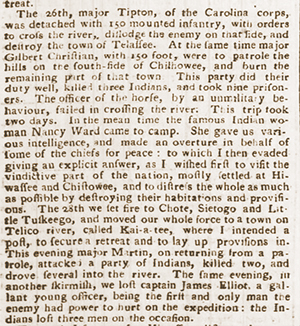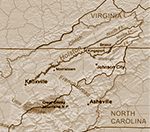 |
|||
|
|||
Destruction of the Cherokee Towns |
|||
|
|||
| The Pennsylvania Packet (Philadelphia, Pennsylvania) March 13, 1781 |
|||
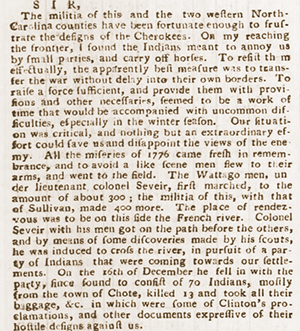
|
|||
Sir, The militia of this and the two western North Carolina counties have been fortunate enough to frustrate the designs of the Cherokees. On my reaching the frontier, I found the Indians meant to annoy us by small parties, and carry off horses. To resist them effectually, the apparently best measure was to transfer the war without delay into their own borders. To raise a force sufficient, and provide them with provisions and other necessaries, seemed to be a work of time that Would be accompanied with uncommon difficulties, especially in the winter season. Our situation was critical, and nothing but an extraordinary effort effort could save us and disappoint the views of the enemy. As the miseries of 1776 came fresh in remembrance, and to avoid a like scene men flew to their arms, and went to the field. The Wattago men, under lieutenant, colonel Seveir, first marched, to the amount of about 300; the militia of this, with that of Sullivan, made 400 more. The place of rendezvous was to be on this side the French river. Colonel Seveir with his men got on the path before the others, and by means of some discoveries made by his scouts, he was induced to cross the river, in pursuit of a party of Indians that were coming towards our settlements. On the 16th of December he fell in with the party since found to consist of 70 Indians, mostly from the town of Chote, killed 13 and took all their baggage, &c. in which were some of Clinton's proclamations, and other documents expresive of their hostile designs against us. |
|||
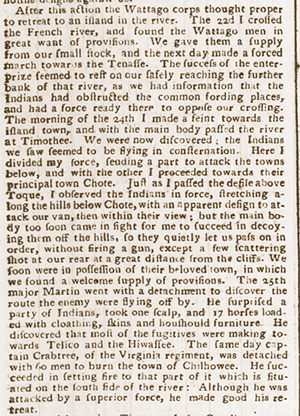
|
|||
|
After this action the Wattago corps thought proper to retreat to an island in the river. The 22d I crossed the French river, and found the Wattago [Watauga] men in great want of provisions. We gave them a supply from our small stock, and the next day made a forced march towarts the Tenasse [Tennessee River]. The success of the enterprise seemed to rest on our safely reaching the further bank of that river, as we had information that the Indians had obstructed the common fording places and had a force ready there to oppose our crossing. The morning of the 24th I made a feint towards the island town,, and with the main body passed the river at Tenassee. We were now discovered; the Indians we saw seemed to be flying in consternation. Here I divided my force, sending a part to attack the towns below, and with the other I proceeded towards their principal town Chote. Just as I passed the desile above Toque, I observed the Indians in force, stretching along the hills below Chote, with an apparent design to attack our van, then within their view; but the main body too soon came in fight for me to succeed in decoying them off the hills, so they quietly let us pass on in order, without firing a gun, except a few scattering shot at our rear at a great distante from the cliffs! We soon were in possession of their beloved town, in which we found a welcome supply of provisions. The 25th major Martin went with a detachment to discover the route the enemy were flying off by. He surprised a party of Indians, took one scalp, and 17 horses loaded loaded with cloathing, skins and houshould furniture. He discovered that most of the fugitives were making towards Telico and the Hiwassee. The same day captain Crabtree, of the Virginia regiment, was detached with 60 men to burn the town of Chilhowee. He suceeded in setting fire to that part of it which is situated on the south side of the river. Although he was attacked by a superior force, he made good his retreat.
|
|||
|
The 26th, major [Jonathan] Tipton, of the Carolina corps, was detached with 150 mounted infantry, with orders to cross the river, dislodge the enemy on that side, and destroy the town of Telaffee. At the same time major Gilbert Christian, with. 150 foot, were to patrole the hills on the south side of Chilhowee, and burn the remaining part of that town. This party did their duty well, killed three Indians, and took nine prisoners. The officer of the horse, by an unmilitary behaviour, failed in crossing the river. This trip took two days. In the mean time the famous Indian woman Nancy Ward came to camp. She gave us various intelligence, and made an overture on behalf of some of the chiefs for peace: to which I then evaded giving an explicit answer, as I wished first to visit the vindictive part of the nation, mostly settled at Hiwassee and Chilhowee, and to distress the whole as much as possible by deftroying their habitations and provisions. The 28th we set fire to Chote, Sietogo and Little Tulkeego, and moved our whole force to a town on Telico river, called Kai -a- tee, where I intended a post to secure a retreat and to lay up provisions in. This evening major Martin, on returning from a patrole, attacked a party of Indians, killed two, and drove, several into the river. The same evening, in another skirmish we lost captain James Elliot, a gallant young officer, being the first and only man the enemy had power to hurt on the expedition: the Indians lost three men on the occasion. |
||
 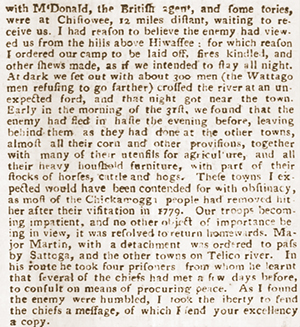
|
|||
The 29th I set out for Hiwassee, distant about 40 mile, leaving at Kai -a tee, under major Christian, a garrison of - 150 men. The 30th we arrived at the Hiwassee, and found the town of the same name abandoned. In patrolling the environs we took a senfible young warrior, who informed us, that a body of Indians with McDonald, the British agent, and some tories, were ar Chisowee, 12 miles distant, waiting to receive us. I had reason to believe the enemy had viewed us from the hills above Hiwassee: for which reason I ordered our camp to be laid off, fires kindled and other shews made, as if we intended to stay all night. At dark we set out with about 300 men (the Wattago men refusing to go farther) crossed the river at an unexpected unexpected ford, and that night got near the town. Early in the morning of the 31st, we found that the enemy had fled in haste the evening before, leaving behind them as they had done at the other towns, almost all their corn and other provisions, together with many of their utensils for agrrculture, and all their heavy houshold furniture, with part of their flocks of horses, cattle and hogs. These towns I expected would have been contended for with obstinacy, as most of the Chickarroggi people had removed hither after their visitation in 1779. Our troops becoming becoming impatient, and no other of object of importance being in view, it was resolved to return home wards. Major Martin, with a detachment was ordered to pass by Sattoga, and the other towns on Telico river. In his route he took four prisoners from whom he learnt that several of the chiefs had met a few days before, to consult on means of procuring peace. As I found the enemy were humbled, I took the liberty to send the chiefs a message, of which I send your excellency a copy. |
|||
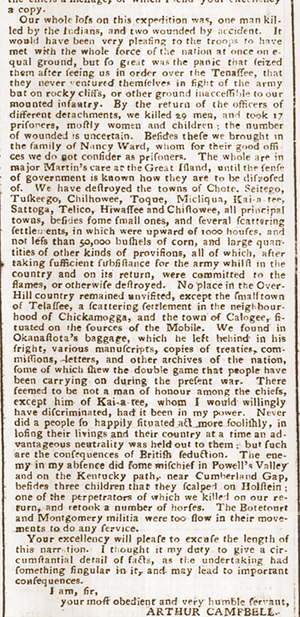 |
|||
| Our whole losss on this expedition was, one man killed by the Indians, and two wounded by accident. It would have been very pleasing to the troops fo have met with the whole force of the nation at once on equal ground, but so great was the panic that seized them after seeing us in order over the Tenassee, that they never ventured themselves in fight of the army mounted infantry. By the return of the officers of different detachments, we killed 29 men, and took 17 prisoners, moftly women and children; the number of wounded is uncertain. Besides these we brought in the family of Nancy Ward, whom for their good offices we do not consider as prisoners. The whole are in major Martin's care at the Great Island, until the sense of government is known how they are to be disposed of. We have deftroyed the towns of Chote, Seitego, Tufkeego, Chilhowee, Toque, Micliqua, Kai -a -tee, Sattoga, Telicor Hiwassee and Chiftowee, all principal towns, befides some small ones, and several featuring settlements, in which were upward of 1000 houfes, and not less than 50,000 bushels of corn, and large quantities of other kinds of provisions, all of which, after taking sufficient subsitance for the army whilst in the country and on its return, were committed to the flames, or otherwise destroyed. No place in the Over - Hill country remained unvisited, except the small town of Telassee, a scattering settlement in the neighbourhood of Chickamogga, and the town of Calogee, situated on the sources of the Mobile. We found in Okanaftota's baggage, which he left behind in his fright, various manuscripts, copies of treaties commissons, letters, and other archives of the nation, some of which shew the double game that people have been carrying on during the present war. There seemed to be not a man of honour among the chiefs, except him of Kai - a - fee, whom I would willingly have discriminated, had it been in my power. Never did a people so happily situated act more foolishly, in losing their livings and their country at a time an advantageous neutrality was held out to them; - but such are the confluences of British seduclion. The enemy in my absence did some mischief in Powell's Valley and on the Kentucky path, - near Cumberland Gap, besides three children that they scalped on Holstein; one of the perpetrators of which we killed on our return and retook a number of horses. The Botetourt and Montgomery militia were too slow in their movements to do any service. Your excellency will please to excuse the length of this narration. - I thought it my duty to give a circumstantial detail of facts, as the undertaking had something singular in it and - may lead to important confequences - I am, sir, your most obedient and very humble servant. |
|
||
|
|||
|
©Roberta Tuller 2025
|
|||
